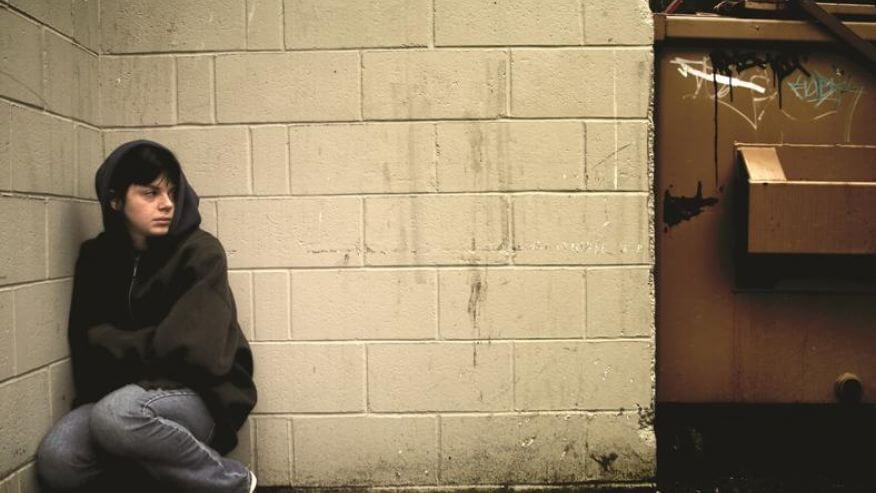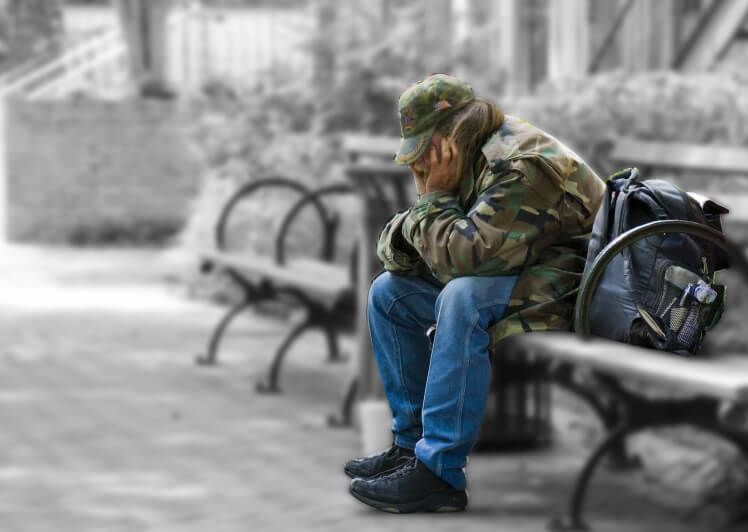-
6 Reasons Why Every Cause Should Talk about Homelessness
 (All light text is a link to articles that prove the sentence)
(All light text is a link to articles that prove the sentence)
I have a number of friends who are activists for various causes. And I love the causes. We are in a water crisis when corporations sell water back to those in drought. Black men are being attacked by U.S. society. Indigenous peoples have always been oppressed and attacked. We live in an age of information and openness, and the realities of racism and sexism in our society are finally being revealed and we are speaking out and taking action.
My plea today, however, that no matter how serious and important your key issues are, you should also be talking about homelessness, and standing with the homeless community. Again, I’m not saying your issue isn’t essential. It’s just that the homeless are the focus of abuse of today’s American society.
I’m going to keep this short, so let me just give you a few statistics.
- The homeless are seen as worse than any other social group
Sociologists have studied the reaction of different social groups to American minds, using an MRI. They have determined that we have a “disgust” response in our brain to certain social groups, including welfare moms, undocumented immigrants and Arabs. But the social group with the strongest and most pervasive negative automatic response is the homeless. Dr. Susan Fiske says that the homeless are considered “inhuman garbage piles”.
The homeless are constantly feared, distrusted and the cause of anger of the far majority of housed people. Cities criminalize the very existence of the homeless, disallowing them to sleep, receive food or finances, and they arrest them for having bedding. This is due to the overwhelming response of the housed who, without cause, blame the homeless for the ills of their society.
- The homeless are life-threatened than any other group
The average life span of an American is almost 79 years old. The average lifespan of a homeless American is 48 years old, 36 percent lower than other citizens. This is a result of stress and trauma, more than anything else. 90 percent of all homeless men suffer from PTSD or other stress disorder. 100 percent of all homeless women suffer from PTSD.
Although most people consider this the fault of the homeless, it is not. Most of the homeless find themselves on the street through no fault of their own, due to job loss or no cause eviction. They are thrust into an impossible economic predicament and then treated like criminals, and due to the stress and poor health conditions, they die young.
- The homeless are severely attacked
About 64 percent of all women are assaulted in their lifetime. About 92 percent of all homeless women are assaulted. All kinds of homeless suffer attacks, and the number of attacks have risen 23 percent in the last few years.
Although the actual numbers seem small, this is because very few attacks on the homeless are reported, because there is such a distrust between the homeless and the police. If they report a crime, they believe that they will be accused of something.
- The homeless can’t hide
The majority of citizens can feel a certain amount of security from the oppression of society if they go into their home and lock the door. The homeless don’t have that luxury. Even those who live in cars or tents are just as vulnerable their shelter as they are outside of it. They are sometimes dragged out of their shelter, only to have it taken from them, because their shelter is not seen to be their possession or to be under the protection of the fifth amendment.
- Truth brings freedom
We can change this, if we all work on it together. The primary source of the suffering of the homeless is the false idea that all the homeless are criminals or immoral. There are two ways that effectively change this point of view. The first is spending time working on a project with the homeless, for then the homeless are seen as equals. The other is if a loud minority continue to speak of the humanity of the homeless. Not just their pitiable state (like I did here), but about their common humanity with us, the shared citizenship, the joy of life, their hope for the future.
-
Every Tragedy is Made Worse by Homelessness
Black men live in oppression. That oppression is made worse by homelessness. Women’s rights should be upheld– but women on the streets have no rights even to survive. LGBT rights are worse when they have no home to protect them. Sex slaves are more frequently raped and suffer when they have no safe home to go to. Poor children find it more difficult to make it to school when they are homeless. For every cause, homelessness is the worse tragedy behind every cause.
Please, alongside your important issues, please speak about the homeless. You can help give them the humanity they lack.
-
Fight in the Spirit
I am in the parking lot of Albertsons and I park and get out of the car and turn to see a young man grab a young woman by her hair and cock back with the other hand clenched in a fist.
“STOP!” I shout and he stops. “Let her go,” I said.
“If I let her go and she runs I am going to come over there and kick your *ss.”
“Fine,” I said, “now let her go.” He does and she gets in to a car and locks all the doors.
The young man comes over with fist clenched and spewing angry colorful metaphors at me. He is in my face. He was drunk. He was near tears.
I just stood there hands at my side and then this voice came out of my mouth, “Can I pray for you?”
Without waiting for and answer I laid my hand on his shoulder and began,”Our Father who is in Heaven….”
By the time I finished the tears were flowing and he walked over to the car and asked for forgiveness and handed her the keys and walked away.
-
Holy Brokenness
 There are some common words that are used for the work of the Spirit—salvation, deliverance, grace, mercy, forgiveness. They all have a common basis, that the one receiving the work of the Spirit has a desperate need. They are in crisis, they are imprisoned, they are beyond their own help, they are desperate, they are separated from their good.
There are some common words that are used for the work of the Spirit—salvation, deliverance, grace, mercy, forgiveness. They all have a common basis, that the one receiving the work of the Spirit has a desperate need. They are in crisis, they are imprisoned, they are beyond their own help, they are desperate, they are separated from their good.In our society we are trained to tell people that we are “fine”. No matter what is going on in our hearts, or relationships, no matter how self-destructive our souls are, no matter what oppression we live with, we are to put on a good face, to display strength.
The Spirit requires three things if we are to receive His work. One is complete honesty. The Spirit wants us to be open about our weaknesses, about our failings, about our hurts. We cannot attempt to hide our true selves from the Divine, because he already knows who we are, to our deepest core, better than we know ourselves.
The Spirit also requires that we take our very selves, our core, and recognize our weakness, our brokenness. We need to look our inadequacies in the face, and admit—if only to ourselves and the Spirit—our brokenness. We are the child who accidentally broke the precious item of the parent. The child has the choice to hide the broken item, or to admit and bring it to the parent. It is the admission that leads to the deepening of the relationship.
Finally, the Spirit requires that we come to him with our broken selves and ask for repair. Just as the child might request, “Can you fix it?” so we come to the Divine and ask for our renewal. Both the parent and the Spirit looks down on the child and says, “Of course.” And that is the grace of the Spirit. He repairs within us what we cannot fix ourselves.
-
What Can You Get for $3?
I am standing in line at McDonald’s. There is a young guy counting out dimes nickles and pennies for one of those dollar burgers and he is 12 cents short. For the lack of 12 cents he was going to go hungry. Plop, a dollar bill covers the pile of change and a have a cup of coffee to wash it down. A grin from the young man.
I place my order and along side me a guy and his girl friend are trying to scrape together change for a large cup of coffee they 30 cents short. Plop and the words no tricks my treat another dollar magically appears in their hands.
Ever tried to eat while sitting across from a street kid counting change to see if he has enough to buy something? It is really hard to swallow.
The kid leans back and the look in his eyes tells you he is way short…..How much ya got I asked. 82 cents he sighs, Plop a couple of bucks magically appear along with a a quarter and voila! the sound of smacking lips and a sigh.
Now I know that some one is going to say “Hey that was $4.25 not $3!” but ya know our Father in heaven has a policy of pressed down and over flowing when it comes to passing out blessings and, well, its contagious….
-
Dealing with Chronic Stress
 I’ve got some severe chronic stress in my life, and it will take a long time to recover from it. It’s good that I know about it, and good that I’m working on bringing balance in my life. Even with the balance, however, it will still take a long time, perhaps years, to recover from the years of emotional and physical pummeling I allowed my mind and body to suffer.
I’ve got some severe chronic stress in my life, and it will take a long time to recover from it. It’s good that I know about it, and good that I’m working on bringing balance in my life. Even with the balance, however, it will still take a long time, perhaps years, to recover from the years of emotional and physical pummeling I allowed my mind and body to suffer.Studies have shown that every single person who has suffered chronic poverty or homelessness also suffer from some kind of chronic stress condition. This shouldn’t be surprising, but it isn’t something that we often think about either. Ninety percent of homeless men suffer from Post-Traumatic Stress Disorder, and a hundred percent of homeless women. A person who suffered from homeless for more than a year is a prime candidate for adrenal fatigue. The chronically poor person will often suffer from a cognitive disorder related to stress, causing one’s attention to only focus on the short term.
Symptoms of chronic stress disorders might include:
- Insomnia
- Anxiety or depression
- Increased feeling of pain
- Lack of energy
- Increased need for protein and fats
- Decreasing ability to handle stress
- Morning fatigue—inability to feel alert for hours after waking
- Body pains, usually as a result of tensing parts of the body, such as the jaw.
- Overreaction to petty annoyances
- Frequent sighing
- Weight gain or loss without a change in diet
- Self-medicating with drugs or alcohol
- Trouble learning new information
Many of the poor and homeless experience these symptoms, causing increased mental health issues and more severe physical crises. Also, the longer one suffers chronic stress from being poor or homeless, the less likely one will have the cognitive ability to escape such states.
Our society somehow expects the poor and homeless to leave poverty by increasing the stress load they already experience. If a person has a cognitive breakdown, unable to function in a modern work environment due to accumulated stress, then they are called “lazy” instead of what they really are: mentally broken by severe stress.
If you are poor or homeless and recognize that you are suffering from this level of extreme stress, there are some things you can do. We need to recognize this: any change in our lives has a cost. Any new discipline takes time or energy or both and if we are going to see improvements in our lives, we will have to sacrifice something we consider essential in our lives so we can make an overall change. I know for me, I realized that I couldn’t keep expressing fury at small slights, because I was breaking down trust.
The other thing that made me realize that I had to deal with stress is because the stress I was experiencing was bleeding out to my wife, children and others I lived with. Everyone had to deal with my stress, not just me. If I was going to bring health to everyone (or anyone) I knew, I had to get to a place where I could control myself.
Here are some things that we can do to deal with our stress, bit by bit. There are no quick answers here. If we have dealt with (are dealing with) severe stress for years, it will take years to overcome those symptoms completely even after we get out of poverty. This sounds overwhelming, but it’s not. It just takes time.
- Eat differently
In our moments of deep stress (which might happen parts of every day), our body wants to eat a lot of calories, usually filled with protein and sugars and fat. It’s okay to treat ourselves with that every once in a while, but we need to keep it as a treat, not as a regular part of our diet. There are three ways we can eat differently that will decrease our stress:
-Eat fewer calories
-Eat frequently and regularly
-Eat more fresh vegetables, less meat and fats
I know that eating more veggies seems tough because fresh veggies are expensive. One thing I’ve found is helpful is that carrots are pretty cheap, tasty and they are filling. Some folks don’t have the teeth for carrots, so I’d recommend spinach, which is full of great nutrition and not expensive if you buy it in a bundle. If you don’t like spinach plain, throw it in casseroles or sandwiches. Just look at your grocery store and see what sales you can find.
Again, I know this transition is tough. It’s hard for me, especially the reduced calories when my body is demanding food to have more energy to deal with the stress. But you will get used to it eventually.
- Increase activity
This is usually known as “exercising”. The problem with exercising is that we have to create a time and place to do it, and we might not be able to. But we should just generally be finding ways to increase our activity. If you have a car, instead of taking it everywhere, walk. Or just walk around the block a few times. I found that if I do a few sit-ups or push-ups in the morning right after I wake up that I’m generally more alert.
But what killed me early on in trying to exercise is doing too much. When we lead a stressful life, what might be considered a beginner’s pace of exercise will exhaust us, and then we don’t have the energy to do what we need to the rest of the day. Take it slow, ease into it. Gentle, slow exercise is great to start with, and then increase it as you feel you are able. Just don’t quit.
- Get in the zone
In my family, full of creative people, we have what we call “the zone”. It’s a mind-space, a kind of self-hypnotism, where we can do creative work or deep thinking. My one daughter writes novels, another daughter draws, my son paces and listens to music, I write essays, and my wife reads. When we do this activity, our primary mind shuts down and we become really focused on our task. I can get in the zone watching movies, or through prayer, others do this through meditation or listening to music. The important thing is that you aren’t allowing your mind to “shut off” or to be passive. Rather, we are focusing our energy on one activity. This can replenish our whole mind to accomplish all kinds of tasks that we otherwise would be unable to do.
- Laugh
Depression is a real thing, and it results in sapping the energy from our lives, so we feel we can’t do anything. And enjoying ourselves really helps us build our energy again, if only for a while. Find someone you really enjoy being with and spend time with them. Watch a movie you really enjoy or read an entertaining book. Read stupid puns and jokes until you laugh out loud. Once you start, you’ll find there’s a lot of things around you that are funny, even tragic circumstances in your life. You’ll feel better and have more building blocks to deal with things in your life. Try not to use alcohol or some other substance to instill joy in your life, though. Because while it will temporarily fill this need, the overall cost is greater than what it gives you, throwing you into a deeper depression.
- Get time off of the internet
Most of us have the internet now, and it is great. We are able to communicate with people we never had before and we have so many more jokes to laugh at. However, spending time on social media also sucks energy out of our lives. I know that I would spend time on Facebook in order to feel like I’m connecting with others while I was also keeping at arm’s length from them. It provided me with a false rest. Recognize that interacting on the internet is work, although a low-level work. So let’s take a break from it. Instead of the internet, read a book, talk to a friend, take a nap. Then get back on. Because you need to…
- Get support
Honestly, the best place to find support for your chronic stress issues is the internet. In general, most people don’t understand. But there are plenty of people who do. There is a support group called “stress.supportgroups.com”. Find a place you feel comfortable with and an online group that you can vent to, and they’ll help you and you can help them. If you can find a doctor or therapist (covered by Obamacare!) or pastor who can help you out, that’s great, too. But don’t try to overcome stress yourself. It’s too stressful.
- Be grateful
One of the greatest things to give you happiness is to regularly express your thanks for the people and things and situations that make your life better. It isn’t enough just to think about it for a moment. You need to speak how much you appreciate them. The best thing is to find a person who has really helped you and express your gratitude to them. In a letter or in person, but just do it. After that, think of another person and do the same thing. You won’t believe how much better you feel.
- Help others
One of the best ways to get out of our own stress is to help others with their stresses. It is a key building block to happiness, and it exercises parts of our brain like compassion and hope that we might not otherwise be able to utilize. It may be we can cook something for a friend, or seek to volunteer at a place that has helped us out. But we will find our stresses reduce when we think about how to improve other’s lives.
One last thing I want to mention. Any organizations out there that help the poor or the homeless, hear me out. Part of our main task should be to reduce the stress of our guests. If we give them too many hoops to jump through, especially when they are unnecessary, we aren’t helping them, but piling on stresses that make their lives more difficult. Let’s provide entertainment for them. Let’s see if we can give them breaks. Let’s help them with better food and opportunities to volunteer. But most of all, let’s be gentle and hopeful.
Sources:
The American Society on Stress– http://www.stress.org/stress-effects/
Natural News– http://www.naturalnews.com/019339_adrenal_fatigue_chronic_stress.html#
Psychology Today– https://www.psychologytoday.com/blog/in-the-face-adversity/201202/ways-manage-chronic-stress
3733 N Williams Ave
Portland, OR 97227
503.888.4453
AnawimCC@gmail.com
Ministry Locations and Times »














